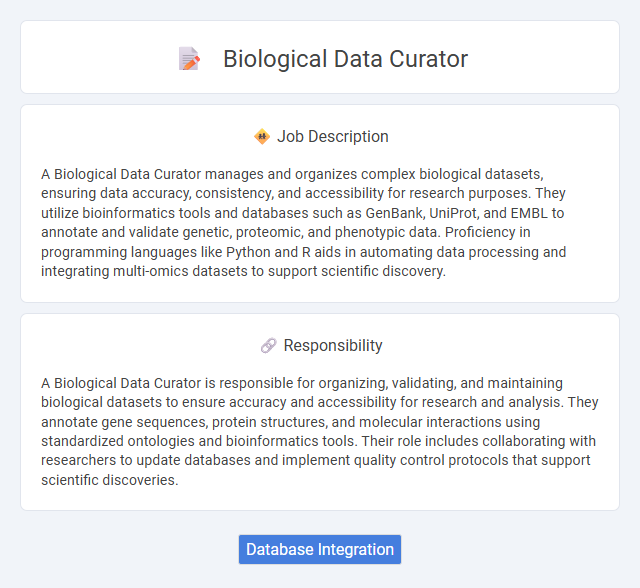
A Biological Data Curator manages and organizes complex biological datasets, ensuring data accuracy, consistency, and accessibility for research purposes. They utilize bioinformatics tools and databases such as GenBank, UniProt, and EMBL to annotate and validate genetic, proteomic, and phenotypic data. Proficiency in programming languages like Python and R aids in automating data processing and integrating multi-omics datasets to support scientific discovery.
Individuals with strong analytical skills and a keen attention to detail are likely to be well-suited for a Biological Data Curator role, given the necessity to manage and validate complex datasets. Those with a background in biology or bioinformatics and the ability to work independently may find this job aligns with their expertise and work style. People who prefer dynamic and research-focused environments will probably thrive, while those uncomfortable with repetitive data management tasks might find it less suitable.
Qualification
A Biological Data Curator typically requires a strong background in molecular biology, bioinformatics, or a related life science field, often supported by a bachelor's or master's degree. Proficiency in data management tools, biological databases like GenBank or UniProt, and familiarity with ontologies such as Gene Ontology (GO) are essential qualifications. Experience with programming languages like Python or R for data analysis and the ability to ensure data accuracy and consistency enhance job performance.
Responsibility
A Biological Data Curator is responsible for organizing, validating, and maintaining biological datasets to ensure accuracy and accessibility for research and analysis. They annotate gene sequences, protein structures, and molecular interactions using standardized ontologies and bioinformatics tools. Their role includes collaborating with researchers to update databases and implement quality control protocols that support scientific discoveries.
Benefit
Biological Data Curators likely benefit from enhancing the quality and accessibility of scientific datasets, which may accelerate research and discovery in biotechnology and medicine. Their work probably improves data integrity and usability, facilitating more reliable analyses and collaborations among researchers. Job satisfaction tends to be high due to contributing to scientific advancement and working with cutting-edge biological information systems.
Challenge
The role of a Biological Data Curator likely involves navigating complex datasets with varying formats and sources, presenting challenges in maintaining data consistency and accuracy. Managing rapidly evolving biological information may require continuous learning and adaptation to new tools and standards. Ensuring high-quality data integration might demand meticulous attention to detail and strong problem-solving skills.
Career Advancement
Biological Data Curators play a crucial role in organizing and maintaining biological datasets for research and clinical use, enabling faster scientific discoveries. Mastery of bioinformatics tools, database management, and data annotation techniques enhances career prospects, leading to roles such as Senior Data Scientist or Bioinformatics Manager. Continuous professional development, including certifications in data science and genomics, significantly boosts opportunities for leadership positions in biotechnology and pharmaceutical industries.
Key Terms
Database Integration
A Biological Data Curator specializing in Database Integration manages and harmonizes large-scale biological datasets from diverse sources to ensure accurate, consistent, and accessible information for research purposes. Expertise in bioinformatics tools, SQL, and data standards like MIAME or FAIR principles enables seamless merging and annotation of genomic, proteomic, and phenotypic data across multiple platforms. Efficient database integration enhances data interoperability, supports advanced biological analysis, and accelerates discoveries in genomics and systems biology.
 kuljobs.com
kuljobs.com